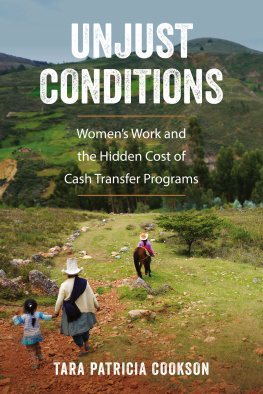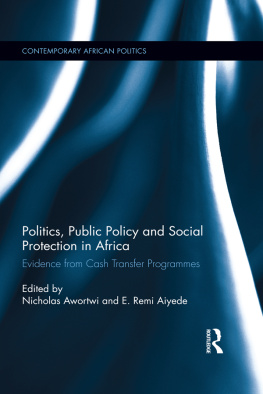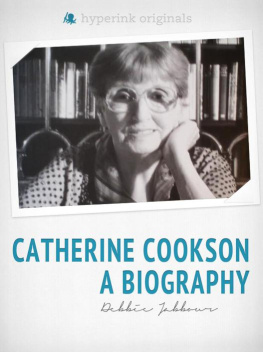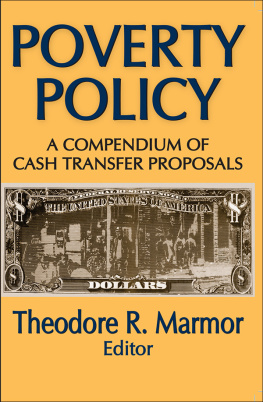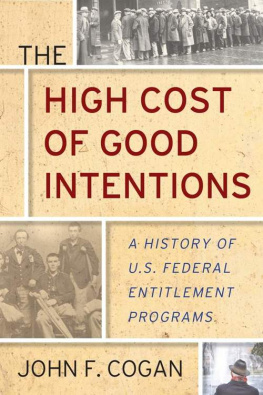Contents
Luminos is the Open Access monograph publishing program from UC Press. Luminos provides a framework for preserving and reinvigorating monograph publishing for the future and increases the reach and visibility of important scholarly work. Titles published in the UC Press Luminos model are published with the same high standards for selection, peer review, production, and marketing as those in our traditional program. www.luminosoa.org
Unjust Conditions
Unjust Conditions
Womens Work and the Hidden Cost of Cash Transfer Programs

Tara Patricia Cookson

UNIVERSITY OF CALIFORNIA PRESS
University of California Press, one of the most distinguished university presses in the United States, enriches lives around the world by advancing scholarship in the humanities, social sciences, and natural sciences. Its activities are supported by the UC Press Foundation and by philanthropic contributions from individuals and institutions. For more information, visit www.ucpress.edu .
University of California Press
Oakland, California
2018 by Tara Cookson
Suggested citation: Cookson, T. P. Unjust Conditions: Womens Work and the Hidden Cost of Cash Transfer Programs . Oakland: University of California Press, 2018. DOI: https://doi.org/10.1525/luminos.49
This work is licensed under a Creative Commons CC BY-SA license. To view a copy of the license, visit http://creativecommons.org/licenses .
Cataloging-in-Publication data is on file at the Library of Congress.
ISBN 978-0-520-29699-2 (paperback edition)
ISBN 978-0-520-96952-0 (e-edition)
To Anita, Carmelina, Elvia, Maritza, Noemi, Rocio, and Victoria. And to Cecilia, whose vision for development is based on what women know is already there, instead of what others think is lacking.
The world will look different if we move care from its current peripheral location to a place near the centre of human life.
J OAN T RONTO , M ORAL B OUNDARIES , 1993
CONTENTS
ILLUSTRATIONS
MAPS
FIGURES
PREFACE
I have chosen to write this book in a way that is informed by critical theories of development and feminist scholarship, but that places lived experience front and center. My professional engagements with international development and global health have taught me many things. One of these has to do with the contemporary fanaticism around data-driven development. While undoubtedly well intentioned, the obsession with data comes with a number of risks. For instance, nongovernmental organizations and other development actors reliant on external funding are increasingly pressured to produce measurements of the problems they intend to solve and the impacts they are (and are not) having. While not inherently problematic (interventions of any sort ought to be justified), this research is often time-crunched and underfunded. As a result, it may not be rigorous and/or it may be so tightly oriented toward practical usage that it may lack a critical analysis altogether.
On the other hand, universities produce a great deal of rigorous research from a critical perspective. The research is often slow, having taken place over extended periods of time and having been subjected to peer review. University researchers are more likely to discover and make use of a diverse range of qualitative and quantitative research methods. These are benefits of academic research, but there is also a downside. Unlike gray literature studies, much academic research is inaccessible postpublication. It lands behind restricted-access paywalls that make it off-limits to nonacademic policy makers, social entrepreneurs, funders, development practitioners, and interested members of the public. During a portion of the time I spent writing this book, I was working as an independent research consultant and did not have a university affiliation. As a result of this I had to borrow my romantic partners university login information to access articles that I myself had authored! A great deal of English-language academic research is also inaccessible to academics who reside in underfunded institutions, often in the very countries in which most development studies are carried out. One consequence of all this is that the important insights generated by slow research too seldom influence policy debates in the ways that they could.
This circumstance, in which development interventions are increasingly data-driven but the data is not diverse, has shaped my approach to the book at hand. This book is based on well-funded, slow research, and it is published in an open-access format. My hope is that the research will enrich classroom discussions and scholarly argument, and that its influence also will extend beyond the silos of the academy to find pragmatic utility in the boardrooms of international development institutions, meeting spaces of nonprofit organizations, and dinner conversations of hopeful social entrepreneurs and tireless human rights activists.
ACKNOWLEDGMENTS
This book, and the research that informs it, was made possible by the generous and caring support of people and institutions across three continents, for which I am profoundly thankful.
First and foremost, I would like acknowledge my research participants, who remain anonymous here, but to whom I am enduringly grateful for allowing me into their homes and their places of employment, and for sharing the details and their interpretations of their everyday lives.
In Peru, I found support in many corners. Thank you to Lewis Taylor, for inviting me to a fiesta in his home, where, in his words, I conducted the first two months of my research in a little under three hours. I am indebted to Cecilia, my closest ally during field research, whose energy, sharp critique of development, and love of her country, colors every page of this book. I am thankful for my many friends in Cajamarca, including Rosi, Pepe, and Xochi, for their hospitality and conversation; Mirtha, whose critique of the perverse forms that development can take provoked deeper analytical work; Patrick, Heidi, and Tessa, whose Van Gogh Caf was a home away from home; and Kyra, for countless conversations on dilapidated spinning bikes and, four years later, over humitas and pickled onions in Salas. I am grateful for Mark Yeungs company during the trying course of fieldwork; his professional encounters with Perus elites also offered nuance and context that I would otherwise not have had.
The intellectual contributions to this book were extensive. Words hardly capture my gratitude for the enduring guidance and generous readings provided by Sarah Radcliffe, whose commitment to the women with whom she works and to producing scholarship of integrity, is a source of inspiration. Thank you to Christine Oppong for mentorship during fieldworks foggy moments, for readings of chapters, and for many, many discussions about care. During my dissertation viva, Maxine Molyneux and Liz Watson provoked my thinking about power, and that discussion has informed the analysis I present in the pages that follow. The next day, Maxine encouraged me to write this book. I have benefited from feedback and conversations at conferences, workshops, reading groups, and seminars, with Penelope Anthias, Jelke Boesten, Lorena Fuentes, Jasmine Gideon, Laura Loyola-Hernandez, Hayley Jones, Lena Lavinas, Stephanie Rousseau, Sofia Zaragocin, Vicky Lawson, Sarah Elwood, and the Relational Poverty Network. I am grateful to Emily Rosser, who during a patchy Toronto-Cajamarca Skype call suggested that I read Dorothy Smiths Institutional Ethnography, which changed the course of this research for the better. Megan Rivers-Moore offered support in preparing the book proposal, and Lizzie Richardson provided comments on a draft of my Antipode paper that continue to inform how I think and write about inclusion. Anna Cant, Brianne Kent, Constanza Tabbush, Miranda Bryant, and my anonymous reviewers enriched this manuscript through thorough and helpful readings of many draft chapters. Thank you to Alissa Trotz, for introducing me to critical feminist theories of care, and for encouraging me to apply to the University of Cambridge and the Gates Cambridge Scholarship so that I might pursue the studies that led to this book.

